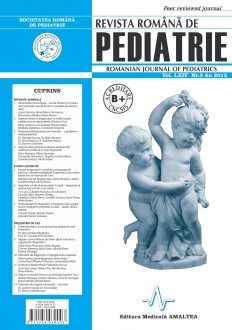SELECT ISSUE

Indexed

| |

|
|
|
| |
|
|
|

|
|
|
|
|
|
|
HIGHLIGHTS
National Awards “Science and Research”
NEW! RJP has announced the annually National Award for "Science and Research" for the best scientific articles published throughout the year in the official journal.
Read the Recommendations for the Conduct, Reporting, Editing, and Publication of Scholarly work in Medical Journals.
The published medical research literature is a global public good. Medical journal editors have a social responsibility to promote global health by publishing, whenever possible, research that furthers health worldwide.
CONCOMITANT INGESTION OF ETHYLENE GLYCOL AND ETHANOL: A DIAGNOSIS TRAP?
Otilia-Elena Frasinariu, Aniela Rugina, Cristina Jitareanu, Radu Russu, Nicolai Nistor and Violeta Streanga
ABSTRACT
Ethylene glycol is one of the most toxic alcohols; it may be accidentally or intentionally consumed as a substitute for ethanol or related to suicidal attempts. Ingestion of ethylene glycol causes a severe metabolic acidosis with increased anion and osmotic gap due to its toxic metabolites, leading to a clinical picture of central nervous system depression, cardiovascular and renal impairment. A 16-year-old boy was admitted with clinical and biological signs of ethylene glycol poisoning after simultaneous ingestion of antifreeze and ethanol. The patient had mild anion gap metabolic acidosis only at the debut, rapidly corrected with one dose of sodium bicarbonate; further evaluation did not reveal acidosis, even if the subsequent evolution included acute renal failure requiring hemodialysis. Due to the absence of a positive history and of a persistent metabolic acidosis, the diagnosis of ethylene glycol poisoning was delayed until it was confirmed by serum toxicological test. Conclusions: concomitant ingestion of ethanol may mask the symptoms of ethylene glycol poisoning; the absence of persistent metabolic acidosis does not rule out the diagnosis.
Keywords: ethylene glycol, metabolic acidosis, acute renal failure, hemodialysis, poisoning
